By Jodie Kell
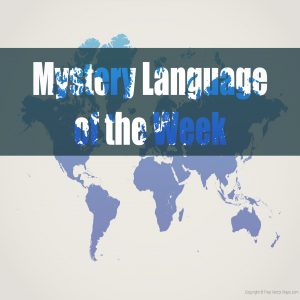 Each week of this year PARADISEC is broadcasting a Mystery Language of the Week. Published on our website through a popular audio platform, as well as through social media, we are asking people for help in identifying languages in our archive by listening to short audio grabs and contributing their knowledge to the descriptive metadata.
Each week of this year PARADISEC is broadcasting a Mystery Language of the Week. Published on our website through a popular audio platform, as well as through social media, we are asking people for help in identifying languages in our archive by listening to short audio grabs and contributing their knowledge to the descriptive metadata.
2019 is the UNESCO International Year of Indigenous Languages (IYIL). The Permanent Forum on Indigenous Issues said that 40% of the estimated 6700 languages spoken around the world were endangered, and most of these are Indigenous languages. This puts the associated cultures and knowledge systems at risk, since Indigenous languages “represent complex systems of knowledge and communication and should be recognised as a strategic national resource for development, peace building and reconciliation.” (https://en.iyil2019.org/about/#about-1)
One of the aims of the year is to mobilise and connect different organisations, communities and individuals for coordinated action on the “urgent need to preserve, revitalize and promote indigenous languages around the world” (https://en.unesco.org/news/unesco-launches-website-international-year-indigenous-languages-iyil2019). The IYIL website contributes to raising awareness about issues surrounding Indigenous languages by providing information, including a calendar of events and access to resources, and enabling organisations to register and actively participate. (https://en.iyil2019.org/) PARADISEC has registered and is planning a series of activities to support the IYIL and use the coordinated approach promoted on the website to expand the reach of our archival materials and our organisation.
One such activity is the Mystery Language of the Week, connected to the IYIL initiative of “Creating favourable conditions for knowledge-sharing and dissemination of good practices with regards to Indigenous languages”. We are broadcasting audio excerpts from items in our collection that are missing language metadata. We ask listeners to share their knowledge about these languages, helping us to better describe our records and promote community access to the PARADISEC archive and the recordings it holds.
PARADISEC digitises a range of formats including original reel to reel and cassette tapes and we include metadata to aid dissemination.
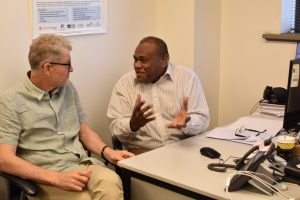
One of the data fields is language, noting the original language as given by the depositor and categorising both subject and content languages according to the International Standard for Language Codes, ISO 639-1. It is clear that detailed notes on the containers of items are very valuable, but sometimes these notes are incomplete, missing or illegible or field notes are separated from the recordings. This means we have recordings of languages that are unidentified in our collections.
Metadata improvement is one of PARADISEC’s priorities. In 2017, we received funding from the Australian National Data Service to work on the extensive Papua New Guinean materials held in our archive. Steven Gagau came on board at that time, providing language support and cultural assistance for metadata enrichment for materials related to PNG, Solomon Islands and Vanuatu. His notes in the catalogue include language or regional identification, transcriptions and cultural information.
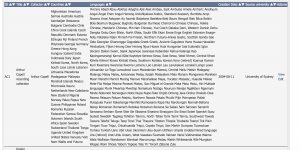 However, despite this valuable work, there are still collections that have languages described as “undetermined”. The reasons for this lack of metadata are varied and can include the size and date of the
However, despite this valuable work, there are still collections that have languages described as “undetermined”. The reasons for this lack of metadata are varied and can include the size and date of the
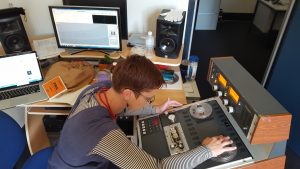
collection. For example, AC1 is Arthur Capell’s large collection of 226 items covering a wide range of countries from the 1950s to the 1970s. In an agreement with the Australian Institute of Aboriginal and TorresStrait Islander Studies (AIATSIS), PARADISEC digitised the non-Australian items of the collection in 2016. Because Capell had passed away in 1986, the metadata is based only on information held in the notes and the report accompanying the items.
As a PhD student, I have been reflecting on the important but time-consuming nature of data management of a research collection of audio, video, photographs, and field notes. Naming conventions, archival preparation, and data descriptions are vital to future identification and usefulness of the collection. As I work through my own data I have come to view data management not as having a set endpoint but rather as continuing dialogic process. New technologies invert the traditional relationships between performers, custodians, researchers and archivists. Where once archives were places of centralisation that you could only gain access to by actually going there, the innovation of digital media and internet services has opened up the archive for remote access offsite, enabling interested communities and researchers to engage with the materials and provide advice and information back to the archive.
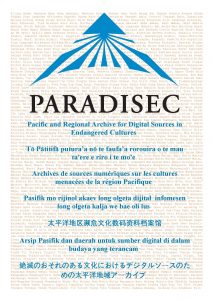
This is where Mystery Sound of the Week comes in. Each week as a PARADISEC audio engineer, I edit a short excerpt from an item missing language information and broadcast it. Listeners can comment via social media, email or through our website. Contributors are able to feel positive about improving description of the collections held in PARADISEC and may learn about collections relevant to their communities. They are also rewarded with a fabulous PARADISEC tea towel as a thank you for contributing to the PARADISEC archive.
So how to access this exciting opportunity?
You can access the recordings here and get involved by sharing the audio, sharing your knowledge and helping us identify endangered languages and music from the PARADISEC archive.
 Follow
Follow